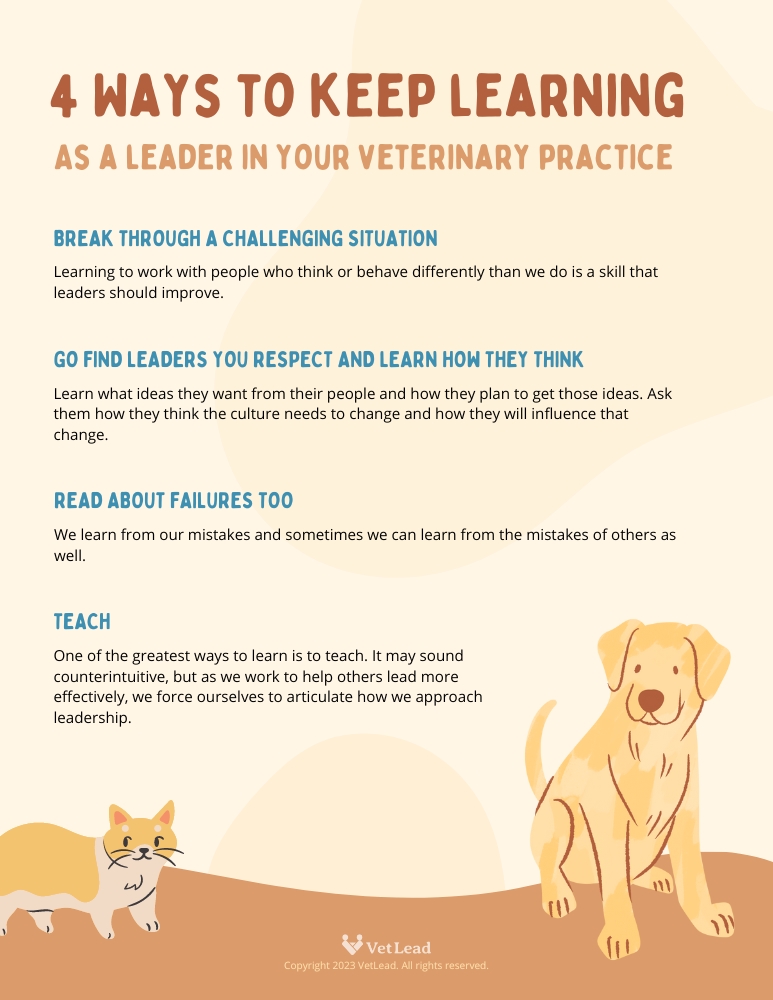I began working with a new practice recently. Its owner impressed me during our first discussion, sharing some of the things he learned as a leader in veterinary medicine. I was intrigued by how eager he was to improve his leadership skills, even though he was already very accomplished. I compare this with other practice owners and managers I have encountered during my career who stopped learning about leadership a long time ago.
It’s a pretty consistent truth, in my experience, that the leaders who focus on learning and getting better at their craft end up becoming those rare leaders who can transform any practice. That part is not surprising. The surprising part is the number of leaders who lead today the same way they did decades ago.
No matter what the team, the practice, or the challenge, they stick with the same “management style.” If you want to become a leader who can transform teams and practices, you have to be a learning leader. Here are a few ways to be sure that you are continuing your growth as a leader.
Attempt a breakthrough with a particularly challenging situation.
We all have them. That person or situation that we dread or are not sure how to handle. Often, it is easy to simply write off certain individuals.
We tell ourselves that we just aren’t ever going to be able to work with people like that.
However, we have an opportunity to learn from these challenges. Even if we are working with a person who we believe is a terrible fit for our practice and will need to leave soon, we should test our leadership skills and see if we can build or repair a relationship that may not feel natural. The exit will go smoother and we might even have a chance to positively impact how successful that person is in their next role.
The Veterinary Leadership Program
Get info on this exclusive program.
Learn how to:
- 1Build an accountable team
- 2Make change happen
- 3Improve performance
- 4Hire exceptional talent
Includes live coaching.
Investment will be $897 per person
Learning to work with people who think or behave differently than we do is a skill that leaders should improve.
Go find leaders you respect and learn how they think.
Don’t just ask them what they do, ask them how they think about what they do. If they are preparing for a meeting or a coaching conversation or to tackle a change within the practice, ask them what they consider the most important things to focus on.
Ask them what they think the critical success components are and how they keep these prioritized. Inquire how they plan to get the commitment and full engagement of the team. Learn what ideas they want from their people and how they plan to get those ideas. Ask them how they think the culture needs to change and how they will influence that change.
In my experience, what really separates great leaders from others is how they think about these aspects of leadership.
Read about failures too.
Poor leaders rarely get the opportunity to write a book about leadership. But plenty is written about them, particularly if they cause a practice to fail. Make sure you read both success stories and leadership failures. We learn from our mistakes and sometimes we can learn from the mistakes of others as well.

Download this free PDF now.
No email address required.
When examining good leaders, be sure you are focusing on leaders who were able to sustain their results. Many practice owners or managers can appear successful for a day or even a year or two. But only the great ones can transform teams and make it last. Certainly, there are volumes of information out there about how to become a great leader. As a result, there are many different opinions on the subject.
Read a lot about both the successes and the failures and compare that with your own leadership experience. People can write anything. Make sure you are following the patterns that actually work.
Teach.
One of the greatest ways to learn is to teach. It may sound counterintuitive, but as we work to help others lead more effectively, we force ourselves to articulate how we approach leadership.
Some leaders are “unconsciously competent.” This means they do things naturally, out of habit, or because it just feels right. Teaching this to others makes them think analytically about what they do and the effect it has on others. Also, it causes them to raise their own bar. It is difficult to teach someone to be a better leader, while not holding yourself to that same high standard.
Wrapping Up
There are many ways to learn about how to lead others, and even yourself, better. What’s most important is that we keep learning. If we ever think that we have “arrived” as a great leader, we have simply started our downfall.
The best leaders I’ve had a chance to work with seemed to believe they had only begun to learn about how to do this leadership thing well. While I believe they already knew a lot about great leadership, their mindset ensured that they would continue to improve. As a result, the impact they had on others only increased.
JFK had the line, “leadership and learning are indispensable to each other.” He wrote this for a speech planned in Dallas that he never lived to deliver. And even though he never actually said the words, I think he had it right.
Let us know what you think in the comments section below.

